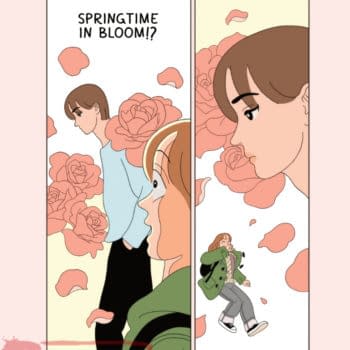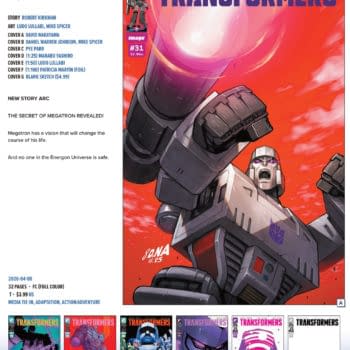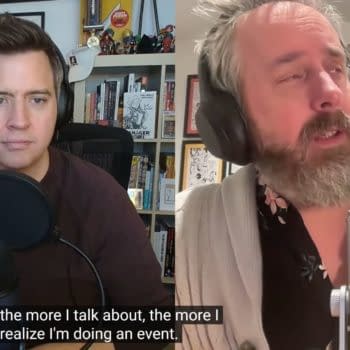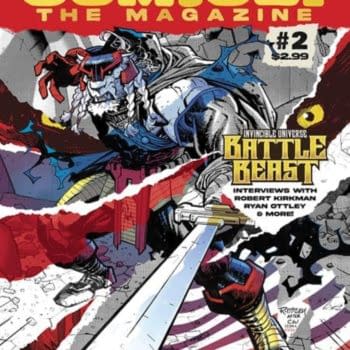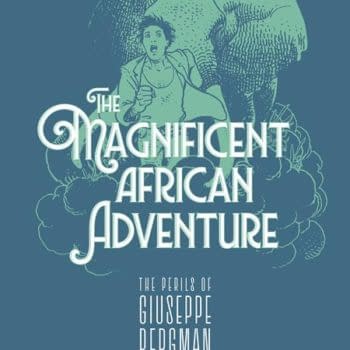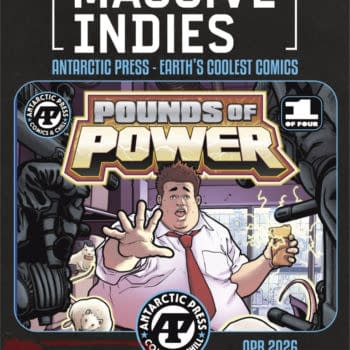Posted in: Comics | Tagged: avatar press, caanan white, kieron gillen, previews, uber
Kieron Gillen Talks About The Uber Volume One Extended Hardcover
With the first story arc having completed and the Uber Volume One Extended Hardcover coming out, I got a chance to talk with creators Kieron Gillen and Caanan White. I'll run White's answers tomorrow. With Gillen I wanted to look back at what his initial goals were for the series and how things ended up. You can tell from his answers that this was a very different kind of comic for him.
BC: There is a quote from you on-line that basically says that you hoped the readers would find the story fascinating and compelling, but that they wouldn't enjoy it. Most writers tell stories to educate or entertain. What was your initial purpose for writing Uber?
KIERON GILLEN: I hoped they wouldn't enjoy it. As much as I wanted to drag people into the world, I wanted to minimise the level of (for want of a better phrase) pop thrill of it. That's tricky. Despite being an alternate history and often dour, it's still a genre book. Trying to balance the two is one of the biggest challenges of doing Uber.
What's the aim? Oh, there's a load. I wanted to try and make the period live, and explore and explode a bunch of issues in a way that are better illuminated through the metaphor of the super-powered humans. WW2 is so used as a period setting, it's started to become meaningless in pop culture. Zombies are basically the same thing as Nazis. Hell, sometimes they are the same thing. They're just a general purpose villain. And, for me, that's the first step towards normalising them, because you've entirely othered them, and just made them "monsters". The scary thing about Nazi Germany is that it was populated entirely with people.
I just wanted to present the period in a way to refresh it to the reader, to stick in the imagination, and hopefully allow them to see how we still live in its shadow.
BC: When dealing with characters of an immoral or amoral nature, the tendency would be to either caricaturize them into something like the Red Skull or to rationalize their behavior with an understandable yet dark logic or even putting them on a path of redemption. You manage to keep them as monsters committing atrocities. How as a writer do you make that decision and then how do you approach a character like that?
GILLEN: Hmm. There are no monsters in Uber, as much as the cast may regularly claim otherwise. There are humans who do monstrous things. The awful thing beneath it all is that people did everything in WW2 for a reason. The thing is that I start the story so far down the hole, at the same time when people have decided that firebombing cities is fundamentally the moral thing to do. It takes a while for us to understand that.
But an important thing is to separate "understanding" with "caring". This book is quite judgemental, and often moral. I think a good chunk of the cast are well past the point of any redemption, even from the first panel. I want to explain and show exactly why, and try and get to the tragedy of all that. To show the towers of self-justification the cast have made, and where that gets them exactly.
There's nothing about Uber that isn't depressing because there's nothing about WW2 that isn't depressing.
BC: Even with the strictest of outlines, stories tend to grow and twist as they are being written. Now that the first arc is complete, how close is the end result to what you had envisioned? What surprises did you find along the way?
GILLEN: There's always surprises in the execution, but I think the book was always the best I can make it at any given moment. The first six episodes were written across the five years. Hell, issue 0 was the second superhero comic I'd ever written, and you can see me wrestling with the ambition and structure of it all (It's the one I recommend you read at least a couple of times to see how it interlocks. I suspect if I wrote it now, I'd find a way to frontload its effect more on the first reading). And later on, the specifics of it is what surprised. I always knew that certain characters would die. It's in the outline. But the specifics – where the axe falls – really came out in the writing. And just the occasional moment of humanity that surprises you. As much as I'm a planner, you have to leave enough to do in the writing process, or it just lies there dead on the page.
I think the surprises are more from now on in. The series bible blocks out the big arcs of it all, but I was always going to develop it along the way, and those arcs are really molten. The experience of the first arc is really the big thing that shaped what came next.
Cutoff for pre-ordering the Uber Volume One Extended Hardcover is tomorrow (August 22nd). Its 336 pages: 176 pages of the original story and 160 pages of additional material including behind-the-scenes interviews, original pencil art, notes from the writer on the development of the story, and a cover gallery. The volume is limited to 5000 copies and an additional 350 'Remarqued' pieces that includes an original sketch and signatures of Gillen and White. This will be the only collection of the series published this year.











